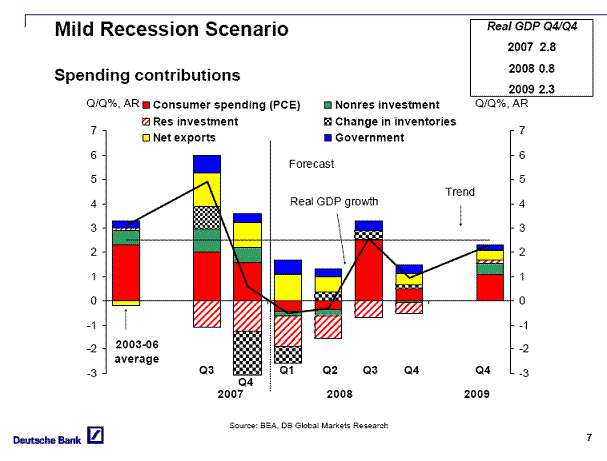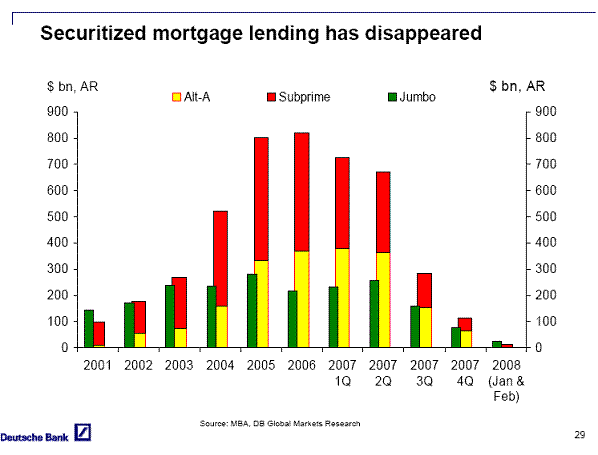The speaker at our UCSD Economics Roundtable this week was Peter Hooper, chief economist for Deutsche Bank Securities. Here is a brief summary of his thoughts about the U.S. economic outlook.
Hooper thinks the U.S. has likely already entered a recession and is expecting U.S. real GDP growth to come in slightly negative for the first two quarters of 2008. His forecast calls for a sharp but brief kick out in the third quarter, thanks to the tax rebate stimulus. He calculates that $100 billion in rebates might translate into $33 billion more spending on final goods and services in the third quarter, or $132 billion at an annual rate, though Robin Moroney and Joseph Carson seem less confident. After any consumption burst, Hooper’s expecting the continuing drag from housing to bring us back to sluggish but positive growth numbers.
 |
Hooper’s view, and I agree, is that the key uncertainty in such forecasts is how big the decline in house prices will prove to be. He guesses that for every 10% additional drop in home prices:
- household wealth falls by $2 trillion
- consumer spending is reduced by 1% via wealth effects
- financial sector losses on foreclosures increase by $50 to 100 billion
- tightening of credit conditions associated with deleveraging
could reduce GDP by an additional 1/4-1/2%
Hooper presented this impressive graph of the impact of the deleveraging so far on the once booming practice of mortgage securitization:
 |
How big will the house decline prove to be? Hooper rightly cautioned that it is difficult to answer that question with great confidence, but offered his reasons for thinking that we might see the overhang of unsold houses begin to drop significantly over the next few quarters, which would limit further price declines.
Let’s hope he’s right. If you’re interested in more details, you can view his presentation here.
Technorati Tags: macroeconomics,
economics,
Federal Reserve,
credit crunch,
recession,
house prices
It would be interesting to compare results of short- and mid-term outlook.
http://ikitov.blogspot.com/2008/04/us-economy-complete-model.html
Hooper believes that housing inventories will likely decline because the supply of new homes is below new household formation. Two observations:
1) New homes are competing with REO’s. Have REO’s peaked? Unlikely. We still have fresh subprime rate resets, Option Arm recasts, and unemployment-induced foreclosures ahead of us. More foreclosures produce falling home prices; falling home prices produce more foreclosures. Most top-down economists ignore this feedback loop when they analyze the (static) supply and demand for homes.
2) The “affordability” calculation likely incorporates some measure of mortgage rates. Is the improvement he shows due to today’s low conforming mortgage rates? If so, one wonders if the measure really captures affordability. Secondly, another barrier to homeownership is the downpayment, and for a wide swath of borrowers it will be years before they can accumulate one.
That said, it was a good presentation in that, at least, Hooper has taken the trouble to quantify the wealth effects of a (static) decline in home prices.
I do not pretend that San Diego is representative of the U.S.
But, in the last downturn in San Diego real estate, prices only began moving up after three things were in place: defaults were falling, employment was rising, and home sales were increasing. Economically, those three variables are proxies for supply overhang, wherewithal to buy, and demand.
Given that we are only 20-25% through the ARM reset process and given that we are seeing return of the risk premium (and will soon see return of the inflation premium), we will see more defaults, not fewer. The household debt/GDP overhang will continue to kill consumption and employment for a long time. Both of those — impaired credit from defaults and falling employment — will crush demand for homes.
I see no rationale for stabilization of home prices anytime soon.
Hooper isn’t considering the other shoe. The other shoe to drop is that in about a year or so, mortgage rates will be substantially higher, because long term rates will be driven higher by the diminution of Asian & petro-state central banks buying our debt…something they will be forced do because of domestic inflation in their respective countries.